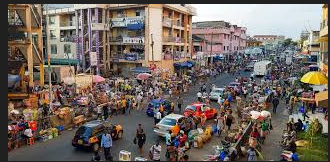Living in Accra on a monthly salary of GH¢1,000 or less is challenging. With rising food prices, transportation costs, and hefty rent, making ends meet can feel daunting. However, it is possible to live and save if you’re disciplined and strategic.
A Practical Guide to Living on GH¢1,000 in Accra
1. Keep Rent Under GH¢200
Limit your rent to no more than 20% of your income—GH¢200 from GH¢1,000. Many low-income earners overspend, with rent often reaching GH¢300–GH¢400, which is unsustainable.
Solutions:
- Seek single rooms in outer areas like Oyibi, Amasaman, and Kasoa.
- Consider shared accommodations to split costs.
- If possible, pay rent annually to ease monthly budgeting.
Realistic range: GH¢150–GH¢200/month for rent and utilities.
2. Plan Your Food Budget Wisely
Eating out can be a financial trap. A daily GH¢15 meal quickly adds up to GH¢450/month—almost half your salary.
Food Strategy:
- Budget GH¢200–GH¢250/month for groceries.
- Buy staples in bulk and cook meals in advance.
- Avoid impulse purchases.
Realistic food budget: GH¢7–GH¢10/day, totaling GH¢210–GH¢300/month if cooking at home.
3. Cut Transportation Costs
Average trotro fares range from GH¢5 to GH¢10 per trip. Commuting daily can lead to expenses of GH¢250–GH¢300/month, which is high for a low salary.
Cost-Saving Tips:
- Walk part of your journey if feasible.
- Consider investing in a used bicycle.
- Explore remote work options with your employer.
Realistic transport budget: GH¢150–GH¢200/month by walking or living closer to work.
4. Save Consistently, No Matter How Small
Many believe saving is impossible on a low income, but consistency is key.
Savings Strategy:
- Save GH¢1 daily, totaling GH¢30/month.
- Use locked mobile money wallets or susu boxes to avoid easy withdrawals.
- Designate your savings for specific purposes.
5. Manage Airtime and Data Usage
ICYMI: McGuinness says they pushed boulder uphill in key game phases
It’s easy to overspend on airtime and data, with many spending GH¢60–GH¢100 monthly.
Ways to Reduce Costs:
- Use Wi-Fi at work or public places.
- Disable auto-downloads on apps.
- Purchase data bundles during off-peak hours.
6. Avoid Debt and Peer Pressure
If you earn GH¢1,000 or less, avoid unnecessary debts. Resist the temptation to buy luxury items or take loans for social appearances.
Practical Advice:
- Only incur debt for essential medical needs or business investments.
- Focus on living within your means.
7. Consider a Micro Side Hustle
Don’t rely solely on your salary. Explore low-capital side hustles that fit your schedule.
Potential Side Hustles:
- Sell sachet water or drinks.
- Offer laundry services.
- Freelance or sell thrift items online.
Even an additional GH¢150–GH¢300 from side work can significantly alleviate financial stress.
The Importance of Intentional Living
Living on GH¢1,000 won’t be permanent. However, wise budgeting can set the stage for future growth. Remember:
- Avoid comparing yourself to those earning more.
- Cut unnecessary expenses.
- Save, no matter how small.
- Invest in skills or business ideas.
Accra may be tough, but smart budgeting can help you find financial stability, even with a modest salary.
SOURCE: PULSE GHANA


























